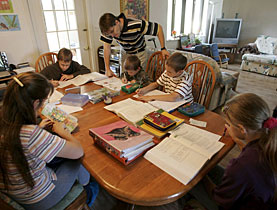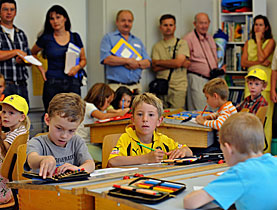A class apart at home

Although growth is not as spectacular as in the United States or Britain, the number of Swiss parents educating their children at home is rising.
Mounting discontent with the state system, bad influences at school, poor moral and religious instruction and the cost of private schools are some of the main reasons inspiring more parents to choose home schooling.
In the US the number of families who educate at home has tripled from 850,000 in 1999 to over 2 million. In Britain it is estimated that about 50,000 children are presently schooled at home, but the number is increasing fast.
Growth in Switzerland is much more modest, but it is now thought that close to 1,000 children are being taught at home.
“There is an upward trend. It has increased quite a bit since the late 1980s, but it’s not a mass movement,” Willi Villiger, from the Homeschool Association of Switzerland, told swissinfo.
Acceptance of home schooling depends on the canton, each of which manages its own educational system. French-speaking cantons generally have the most liberal attitude. In Italian-speaking Switzerland it is forbidden. German-speaking regions are a mix.
Where it is permitted, families have to notify local educational authorities and provide documentation, such as annual or weekly education plans. An annual visit from a school official is fairly common. In some cantons, a teaching qualification is required.
Why home educate?
In a 2006 survey carried out by the US Department of Education, 31 per cent of parents who chose home schooling said they did so out of concern over the school environment. Concerns included doubts about safety, drugs as well as negative peer pressure.
Some 30 per cent said it was a desire to provide their children with religious or moral instruction, while 16.5 per cent said it was dissatisfaction with the academic instruction.
In Switzerland the reasons vary, said Villiger.
“We started in 2001 as the situation in the local school was not good – there were not enough teachers and many changes, and we felt the kids were being neglected,” he said.
“In a certain way our oldest daughter became alienated from us and her school performance got worse. We felt the influences from school were contrary to our Christian education.”
“I have nothing against public education,” said B.A., a father of four children, aged 8-15, who are taught by his wife. He requested anonymity. “But time spent on learning in school is affected by social problems.”
Family dynamic
Home schoolers say children benefit enormously from the flexible approach to education.
“We have a very effective way of learning. In the first few years my wife leads the kids through the curriculum. After that they have to work by themselves. Gradually they manage to work independently to solve problems… they love it,” said Villiger, whose ten children are taught at home.
The family dynamic is very important, added B.A..
“The children respect and learn from each other. The older ones help the youngest and when they teach they learn it even better,” he said. “More time is spent focusing on education and less on conflict resolution. It allows the kids to follow their specific interests.”
Villiger is delighted with his children’s progress.
“When we took my eldest daughter out of school in 2001 she had lost nearly all commitment to school. In two years she changed her work attitude completely and finished her school-leaving exam at state school with excellent marks.
“This would never have been possible if she’d have remained in the public school. In August she will start her studies at university. And in half a year my two oldest sons too will finish their qualifications to go to university,” he said proudly.
Common fears
One of the most common fears is that the home-educated miss out socially and are not exposed to the range of opinions that make up a democratic society.
“Kids are better off with other kids in school where they can mix with people from other social classes,” said Anne-Marie Reymond, responsible for overseeing 60 children who are educated at home in canton Vaud.
“It can be problematic. Some kids are integrated into groups outside the family and others not at all. You notice the ones who cut themselves off – this can be a concern.”
Villiger admitted that the lack of sociability could be a weakness of home schooling.
“You have to face it and see it as something you have to solve,” he said. “It’s the parents’ job to make contact possible outside the family.”
But observations of American home-schooled children at play show they have fewer problems with social interaction than state-educated children, and are involved in a wider range of activities outside the home.
Training
Some critics also question the value of what is taught, since most parents have never received teacher training.
“I find it very dubious when people teach at home without a teacher qualification,” Anton Strittmatter from the Swiss Teachers’ Association told NZZ am Sonntag newspaper. “A teaching permit is the only verifiable criterion to ensure quality.”
But modern times have democratised learning, argued Villiger.
“If parents are ready to learn with their children, they don’t need any qualification, as nowadays information is accessible to everyone.
“You can find very good learning environments on the internet and even state-published teaching material offers a variety of books that are well suited for home education,” he said.
Despite starting home schooling “with trembling fear”, Villiger said it was “one of the best decisions we have ever made”.
“We have a very precious unity in the family,” he said. “We have the feeling that we are on the road together – like pioneers.”
Simon Bradley, swissinfo.ch
Switzerland has no minister for education. Instead the cantons manage their own educational systems with coordination at national level through the organisation representing the cantonal directors of education.
The cantons and communes finance more than 85 per cent of educational expenses.
In Switzerland 95 per cent of children complete their compulsory education at their local public school.

In compliance with the JTI standards
More: SWI swissinfo.ch certified by the Journalism Trust Initiative












You can find an overview of ongoing debates with our journalists here . Please join us!
If you want to start a conversation about a topic raised in this article or want to report factual errors, email us at english@swissinfo.ch.